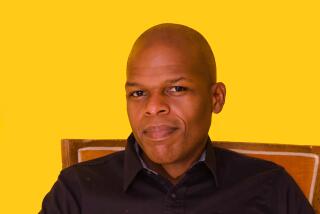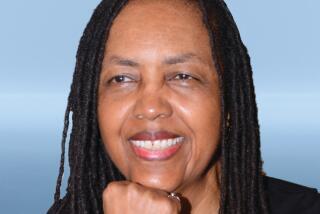BOOK REVIEW : A Free Spirit in a World of Barriers : FREE ENTERPRISE <i> by Michelle Cliff</i> , Dutton, $19, 213 pages
- Share via
Beginning with an actual historical figure, abolitionist Mary Ellen Pleasant, Michelle Cliff imagines what life might have been like in the 19th Century for a woman such as Pleasant who was free, black, a business owner and an anti-slavery activist.
And while her novel, “Free Enterprise,” concerns slavery, there is not one scene about picking cotton on the plantation or outrageously abusive overseers.
The story focuses instead on Pleasant and a friend Cliff has dreamed up for her, a young Jamaican woman named Annie Christmas. Annie, also Pleasant’s comrade-in-arms, has given up her life of privilege, as a member of the island’s mulatto class, to fight for freedom in America. The novel is told in a patchwork fashion that includes straight narrative, letters and flashbacks. The unifying themes are political struggle and aging. We see how Pleasant and Christmas meet, how they aid John Brown in his doomed raid on Harper’s Ferry, how they spend the rest of their lives working for the causes they believe in.
As an anti-slavery activist, Christmas remembers the struggles her mother taught her:
“Have you forgotten the cacique (Indian chief, clan leader) who asked the Spanish, as they tied him to a stake and implored him to accept Christ as his savior before they set him afire, if there were people like them in Heaven? And when they assured him yes , said, ‘I’d rather go to Hell. Do what you must.’ That she’d not forgotten.”
Cliff does a strong job of showing how the abolitionist movement did not exist in a vacuum. This was also the time of the first women’s rights movement and then, as now, gays and lesbians were struggling for public acceptance.
One of the most interesting themes of the novel is how these two dynamic and privileged black women make their way through the upper crust of proper New England society. While some white women shared the abolitionist cause, others did not include black women in the struggle for women’s rights. When, at an aristocratic soiree, hostess Alice Hooper fails to stand up for Pleasant when several of the guests begin making racist comments, Pleasant bristles at the inevitable, but useless, apology note:
“I was expecting something like this. Now what? Do I respond: Dear Miss Hooper, all is forgiven? Dear Miss Hooper, would you feel better if you had no money? Dear Miss Hooper, when you contemplate the slave trade, can you understand the constructive use of violence, in the cause of liberation? And, dear Miss Hopper, this is my final question: Can you accept, nay, believe in the deepest part of yourself, the full humanity of the African? Dear Miss Hooper, I don’t hate you and yours. I love my own.”
There are no clear-cut heroes or villains in “Free Enterprise.” As we learn later in the novel, Miss Hooper is harnessed by her own “differences.” For she is not only a woman in a time when women cannot vote, she is a lesbian in a time when such words were unspeakable. Moreover, her teen-age sweetheart is now a married woman, unhappy and suicidal. As she reminisces on their brief period together, she remembers:
“She’d read of female couples the most daring of pairs, dashing in their wide-brimmed hats . . . traveling with the wagon trains. Women homesteading in the middle of nowhere, say a prairie in Nebraska . . . building from the ground up. . . . And there the fantasy ended, with her feeling silly, having constructed but another pastime. The reality of that existence was not for the likes of her. Unattached female, so dreadfully unattached.”
As the women in this novel struggle with their differing notions of freedom and how to obtain it, they realize that there is only so much they can give, there is only so much they can win. The free world they envision will not come to be in their lifetimes, and that sometimes the simple act of survival is triumph enough.
More to Read
Sign up for our Book Club newsletter
Get the latest news, events and more from the Los Angeles Times Book Club, and help us get L.A. reading and talking.
You may occasionally receive promotional content from the Los Angeles Times.










